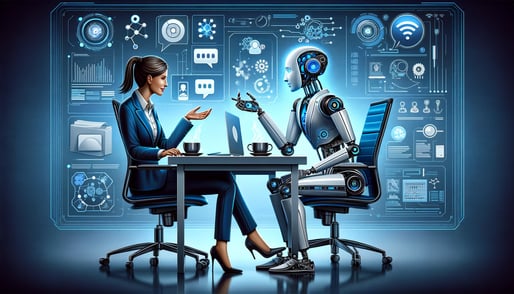Introduction: Unveiling the Role of AI in HR Transforming Practices
AI in HR: Use Artificial Intelligence in Human Resources
AI is transforming HR operations.
Embrace the revolution today.
Here is how AI is changing HR:
- Enhancing efficiency.
- Improving decision-making.
- Analyzing complex employee data.
Unlock insights to improve HR functions.
Are you ready for the AI revolution?
Have a look at how we are using AI for our employees
Transforming Human Resource Management with AI Tools
Transform Your HR Game with AI
Read if you're ready to level up in HR!
AI is changing HR from the inside out. It's not just about data anymore. It's about revolutionizing how we hire, understand, and grow our teams.
Here's how AI makes it all happen:
-
Screening Made Simple
- AI cuts through piles of resumes.
- Finds the gems. Quickly, efficiently.
-
Bias? What Bias?
- AI looks at skills, not names.
- Fair hiring? Done.
-
Predicting Success
- Who will thrive? AI has guesses.
- Not just guesses—educated predictions.
This is just the start. AI in HR means:
- More time for what matters.
- Fairer, faster hiring.
- Insightful, data-driven decisions.
Imagine a world where HR is not just a department but a powerhouse of efficiency and fairness. That's the world AI is creating.
Ready to dive in?
Your move, HR. Embrace AI, embrace transformation.
The Role of AI in Enhancing HR Processes and Teams
AI: The Game-Changer in HR 🚀
(Here's why every HR leader should embrace it)
-
AI automates the mundane.
- Say goodbye to manual CV screening.
- Hello, efficient talent acquisition!
-
AI brings deep insights.
- Understand workforce trends.
- Make smarter HR decisions.
-
AI enhances employee experience.
- From onboarding to engagement.
- Personalized & efficient.
This isn't just about doing tasks faster. It's about transforming HR into a strategic powerhouse. With AI, HR can predict trends, tailor experiences, and drive real business outcomes.
Imagine a world where HR is not just a function but a strategic partner in growth. That's the power of AI in HR.
Start experimenting. Start transforming. Start now.
AI and HR: Implementing AI to Enhance HR Services and Department Functions
Implementing AI in the HR Department: Challenges of AI and Strategies
Implementing AI in the HR department brings its own set of challenges. HR leaders must navigate concerns like human bias in AI algorithms and the need to maintain the human touch in HR services. Strategies to overcome these challenges include continuous learning and development programs for HR teams and using AI tools that complement human intelligence rather than replace it.
How HR Teams are Using AI to Revolutionize Recruitment Processes
AI is revolutionizing recruitment processes in unprecedented ways. HR teams are using AI-powered tools for tasks such as scanning resumes, conducting initial candidate assessments, and even conducting first-level interviews. These AI applications in recruitment not only save time but also help eliminate human bias, making the recruitment process more equitable.
AI in Human Resources: Examples and Benefits for HR Management
The benefits of AI in HR management are wide-ranging. Examples include using AI for performance management, where AI systems can analyze employee performance data to provide more objective assessments. AI also helps in areas like employee engagement and retention, providing HR managers with insights to improve workplace culture and employee satisfaction.
Revolutionizing HR with Generative AI: New Ways AI is Used in Human Resources
Generative AI in Human Resource Management: A New Frontier
Generative AI represents a new frontier in Human Resource Management. This form of AI can create realistic simulations and scenarios for training and development purposes. HR teams can use generative AI for role-playing exercises or to simulate various workplace situations, providing a safe space for employees to learn and grow.
The Impact of AI on Performance Management in HR
AI's impact on performance management in HR is significant. AI can analyze employee performance data more objectively than traditional methods. This allows HR managers to identify areas of improvement and strengths, leading to more effective talent management strategies.
AI and the Human Touch: Balancing Technology in HR
While AI brings many benefits to HR, balancing technology with the human touch is crucial. AI should be seen as a tool to augment HR services, not replace the human elements. HR professionals must ensure that the use of AI in HR complements human intelligence, empathy, and understanding.
The Future of HR: Integrating Artificial Intelligence in HR for Enhanced Efficiency
The Future of Artificial Intelligence in HR: Transforming HR Practices
The future of AI in Human Resources looks promising. AI technologies continue to evolve, offering even more sophisticated applications for HR. This ongoing transformation signifies a shift towards more efficient, data-driven, and unbiased HR practices.
AI's Role in Human Resources: From Recruitment to HR Information Systems
AI's role in HR extends from recruitment to HR Information Systems (HRIS). AI can streamline HR processes, making them more efficient and providing HR professionals with valuable insights. This includes everything from automating administrative tasks to enhancing decision-making processes in strategic HR functions.
How AI Benefits HR: A Comprehensive Overview
The benefits of AI in HR are comprehensive. AI helps HR teams analyze data more efficiently, provides insights for better decision-making, and automates routine tasks, freeing up time for HR professionals to focus on more strategic aspects of their role. AI's role in transforming HR is integral to the future of effective human resource management.
Conclusion: AI's Impact on Human Resources - Elevating and Transforming HR through Technology
AI in Human Resources: The Transformation of HR Service and Efficiency
In conclusion, AI has significantly transformed HR service and efficiency. AI technologies in HR are not just a passing trend but a fundamental shift in how HR operates. By embracing AI, HR teams are becoming more efficient, data-driven, and prepared for future challenges.
The Evolution of HR Practices: AI's Role in Human Resource Management
The evolution of HR practices through AI is undeniable. AI in human resource management has created opportunities for HR professionals to engage in more strategic and impactful roles. The combination of human intelligence and AI brings a new level of sophistication to HR practices.
The Future-Ready HR Team: Embracing AI for Innovative Solutions
The future-ready HR team is one that embraces AI for innovative solutions. AI in HR is about more than just automation; it's about creating opportunities for HR to be more strategic, more insightful, and more impactful. The integration of AI in HR practices is the key to unlocking these possibilities.
FAQs
-
How does AI enhance the recruitment process and impact the HR department? AI can significantly enhance the recruitment process by using artificial intelligence technology to analyze resumes and predict job performance, making it easier to recruit the right new hire or employee. The impact of AI on HR is notable, as it streamlines the recruitment process, offering human resources professionals a more efficient way to identify and recruit talent.
-
What are the various applications of AI in HR, and how do they assist HR professionals? Applications of AI in HR include AI-powered tools for performance management, automated onboarding for new hires, and AI algorithms to analyze employee data for talent management. These technologies provide HR teams with efficient, data-driven solutions, enhancing the overall effectiveness of HR practices.
-
What challenges are involved in implementing AI in HR, and how might generative AI be beneficial? Implementing AI in HR comes with challenges such as ensuring the accuracy of AI algorithms and maintaining the human element in HR practices. Generative AI could offer solutions by creating realistic training simulations, which can be a valuable part of HR, assisting in the learning and development of HR teams.
-
How does AI transform traditional human resource management? AI transforms traditional human resource management by automating routine tasks and providing strategic insights for decision-making. The use of AI in HR can make processes more efficient, enabling HR professionals to focus on more human-centric aspects of their jobs. The impact of artificial intelligence on HR is significant, reshaping how HR functions are performed.
-
What is the perspective of HR professionals on the future of AI in HR? A significant percent of HR leaders believe in the potential of AI in HR. They see AI as crucial to the future of HR, particularly in advancing HR technologies and practices. HR professionals understand the importance of artificial intelligence in continuously shaping and improving HR, foreseeing that AI will increasingly become an essential part of HR operations.
-
How can AI assist HR professionals in managing new employees more effectively? AI can be used by HR professionals to streamline the onboarding process for new employees. It enables personalized training programs and can assist in monitoring their progress, ensuring they integrate effectively into their new roles. This application of AI in HR exemplifies how artificial intelligence can create a more efficient and supportive environment for new hires.
-
What are the potential impacts of AI on the overall HR landscape? AI has the potential to significantly affect human resources, transforming how HR professionals approach tasks and strategies. AI-powered HR systems can make processes more efficient, from recruitment to performance management, impacting HR practices on multiple levels. This evolution shows how artificial intelligence continues to shape the HR field.
-
In what ways does AI enable HR professionals to enhance their HR functions? AI enables HR professionals to automate routine tasks, analyze complex data sets, and provide predictive insights. This use of AI in HR can take on various forms, such as AI-driven analytics for talent management or AI tools for employee engagement, showcasing how incorporating artificial intelligence in human resources can revolutionize HR functions.
- What challenges do HR departments face when using AI, and how can these be addressed?The challenges of AI in HR include ensuring data accuracy, managing privacy concerns, and maintaining the human element in HR practices. These challenges can be addressed by training HR professionals in AI applications, setting clear ethical guidelines, and ensuring AI tools are used as an aid rather than a replacement for human judgment.
- What future developments can HR professionals expect from AI in HR? HR professionals believe that artificial intelligence may continue to evolve, bringing new advancements in HR technologies. Future developments could include more sophisticated AI algorithms for talent prediction, enhanced AI-driven employee wellness programs, and further integration of AI in strategic HR decision-making. This indicates an increasingly significant role of AI in shaping the future of HR.
Tags:
AI ChatbotFeb 17, 2024 11:05:47 AM




.jpg?width=520&height=294&name=Al%20chatbot%20(1).jpg)

Comments